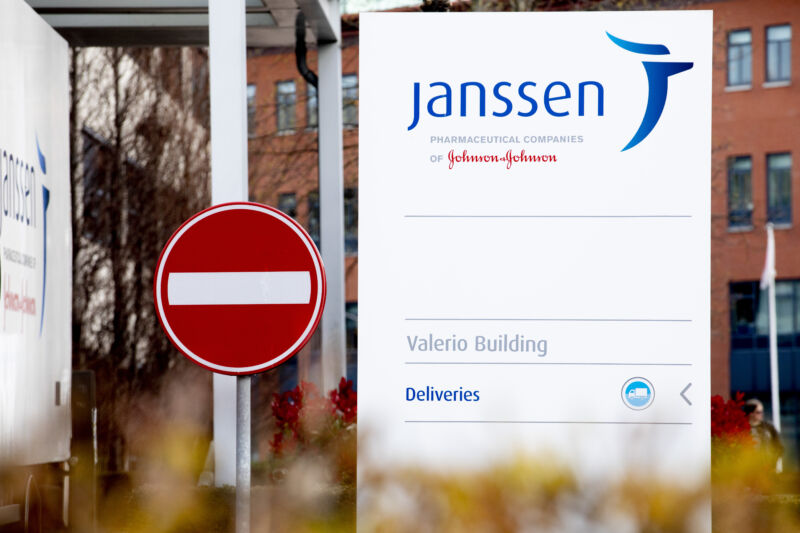pause, shrug —
Poll results contradict concerns that the pause added to hesitancy.
Beth Mole
–

Enlarge / General exterior view of the head office of Janssen pharmaceutical company on April 15, 2021 in Leiden, Netherlands.
About 88 percent of Americans support the pause of Johnson & Johnson’s COVID-19 vaccine, and the pause did not increase vaccine hesitancy, according to fresh data from the Axios-Ipsos Coronavirus poll.
The finding is likely to hearten public health experts, who have faced criticism and concern that the pause could erode confidence in vaccine safety and fortify already high levels of vaccine hesitancy in the country.
The Centers for Disease Control and Prevention, along with the Food and Drug Administration, recommended a pause in the use of the Johnson & Johnson vaccine on April 13 after linking the one-dose vaccine to six cases of a rare blood-clotting condition, one of which was fatal. The six cases occurred among more than 6.8 million people given the vaccine, suggesting that if the blood clots are, in fact, a side effect of the vaccine, they are an extremely rare side effect.
Many experts defended the pause by arguing that the hiatus and full evaluation of the potential serious side effect—even if it’s only a one-in-a-million occurrence—prove that stringent safety monitoring and precautions are in place. Americans largely appear to agree.
In the latest poll, the market research firm Ipsos first asked if people had heard of the pause. An impressive 91 percent of respondents said they had. Of those who said they were aware of the pause, 88 percent responded “Yes” to the question: “Do you believe the FDA and CDC are being responsible by recommending a pause on the distribution of the Johnson & Johnson vaccine?”
The poll was conducted between April 16 and 19 by Ipsos, which drew on a nationally representative probability sample of 1,033 general-population adults, ages 18 or older. For questions posed to all 1,033 people, the margin of sampling error is ±3.3 percentage points at the 95 percent confidence level.
Impotent pause
The poll also suggested that the Johnson & Johnson pause has not increased or decreased vaccine hesitancy.
As in every other previous poll going back to last August, Ipsos pollsters asked everyone: “How likely, if at all, are you to get the first-generation COVID-19 vaccine, as soon as it’s available?” A total of 70 percent said they were likely to get a vaccine or had already gotten a vaccine, while a total of 30 percent said they were “not very likely” or “not at all likely” to get a vaccine.
The total of 70 percent in the “likely/already had” category is basically unchanged from recent polls. In the poll conducted between April 2 and 5, a total of 71 percent of respondents fell into that category, while the total was 69 percent during the poll conducted between March 19 and 22. The same lack of change was seen in the “not likely” category, which also wobbled between an insignificantly different 29 percent and 30 percent in the two previous polls.
Moreover, the numbers are significantly better than the peak of vaccine resistance seen in a late September poll. That’s when only 37 percent said they were likely to get vaccinated and 63 percent said they were not likely to get vaccinated.
Cliff Young, president of Ipsos US Public Affairs, told Axios that “people are unfazed” by the Johnson & Johnson vaccine pause. “The way forward is about the vaccine, so if there’s any stumble, people are going to pay attention to it—but it hasn’t had an impact thus far” on people’s willingness to get the vaccine.
“Not sustainable”
The same results were found in a focus group of vaccine-hesitant Trump voters, according to a report by The Washington Post. Frank Luntz, a longtime GOP communications expert, held the focus group over Zoom on Sunday, involving 17 conservative participants. Throughout the pandemic, Republicans and conservatives have been among the most consistent groups to tell pollsters that they are unwilling or hesitant to get a COVID-19 vaccine. In a recent Kaiser Family Foundation poll, a total of 35 percent of Republicans surveyed said they would definitely not get vaccinated or only get vaccinated if vaccination was required.
The Johnson & Johnson vaccine pause is not changing their thinking one way or the other, according to the focus group. The group largely shrugged off the pause and questioned why the CDC and FDA halted use for a potential side effect that is so rare, the Post reported. “A lot of people might want to take the Johnson & Johnson vaccine versus the others, because it’s one shot versus two,” said a focus-group participant identified as Cathy from Pennsylvania. An epidemiologist who helped convene the focus group further noted to the Post that “we didn’t see folks really concerned with the pause in the J&J vaccine.”
Instead, focus group members were more concerned about recent reports that Pfizer CEO Albert Bourla suggested people may need to get a COVID-19 booster shot within a year. “I feel like this is not going to end,” said a focus-group participant identified as Erzen from New York. “I mean, we’re just going to be shot up and shot up and shot up. We can’t live like this. This is not sustainable.”

